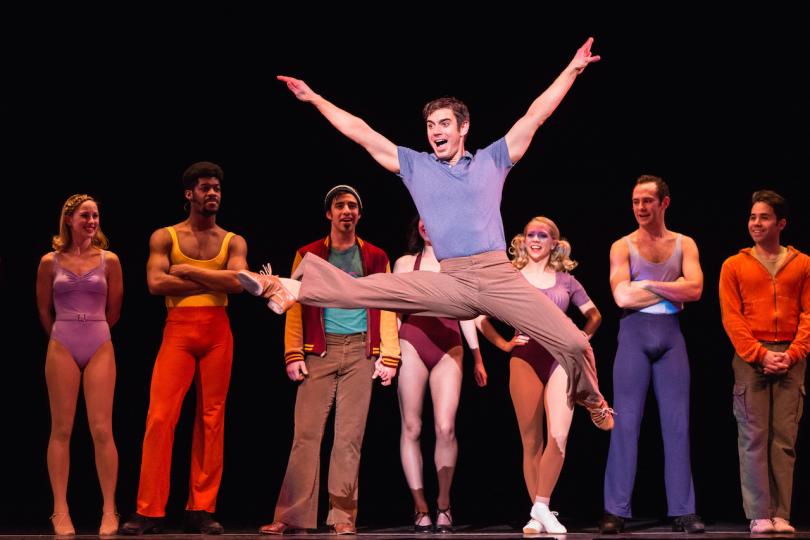Emerging Artist Profile: Nate Stanger

I knew I wanted to interview an emerging stage manager --they are the unsung heroes of theater after all and deserve recognition. But how does one define an “emerging stage manager”? Freshly graduated? Someone who just became Equity? Then I met Nate Stanger and instantly knew his insights would be perfect. He is a stage manager who moved to the Cities for college “because it wasn’t Indiana” and rose through the crew ranks at theaters throughout the area well before he turned the tassel on his graduation cap. He has worked consistently on major productions almost from the beginning. I joked with him that he is probably the highest paid, non-union stage manager in town. Whether that’s true or not, he is definitely someone you want calling cues.
Who is the man behind the headset?
I’m from Indiana originally, and I moved here to go to the University of Minnesota: Twin Cities. I graduated in 2013 and got a BA in Theater Arts. Originally I came here for the performance program, but I really came here to get out of my state and live in a big city. I think the value of the U of M’s program is that it is in a theater city and all the faculty are working in that city; that’s what I wanted.
When was your big break into stage management?
I guess my break was when I had to stop taking other types of work to survive. That was definitely when I got my position at the Ordway as their non-AEA ASM. That came to me when I stage managed a fundraiser cabaret at Park Square for their new Andy Boss stage. James Rocco directed that and he liked me, I guess. He invited me to the Ordway. Before that I didn’t really have any day jobs outside of theater. I worked a lot as an overhire electrician or carpenter. That’s how I got paid what I couldn’t get paid from stage managing. I also did some arts admin for Park Square for a while.
How did arts management experience come to be?
I started there because Megan West - their Production Manager - went on maternity leave and hired me to fill in for her, which I was woefully underqualified for! That’s sort of how you make it the first time though: fake it till you make it. I did that for a couple months and then right as I was about to leave there, the Education Sales Manager went on maternity leave, so I stayed to work in that department. I stuck around after that in a variety of positions until my work at the Ordway began a few months later. Oh, I also ASM’d their Romeo and Juliet.
How did Megan get your name?
Megan got my name when I did line notes for a show the season before. I knew the ASM, who asked me to come in. And coincidentally that ASM and SM [at Park Square] are my colleagues at the Ordway.
I’ve realized that getting work in theater is a blend of being in the place at the right time and doing a good job - recognizing the opportunity and acting on it. I hear a lot of young theater people say, “Oh, well, I was in the right place at the right time! I am so lucky!”, and yes you are super lucky but you also didn’t screw up when you were there. You did well. You took advantage of your lucky opportunities.
What do you feel creates a good stage manager?
I think a good stage manager is someone that anyone can go to talk to. I think that above anything else. The paperwork and the organization is a given--you have to be good at that--but a great stage manager is making sure anyone can come to you for any purpose.
What stage management training (programs, colleges, classes) would you recommend to high school students interested in stage managing? Or just people trying to get into that field?
Just study everything! I became a stage manager because I realized the life of a performer is really hard and felt that I didn’t have that in me. So I was growing disenchanted by it at the same time as I was finding stage management. But when I started the BA program, I knew I wanted to study everything. I kind of figured out that stage management is kind of knowing everything. I already took classes in an array of things - so that paid off well. And it helps you to be able to talk to different people on a production. Dip your fingers in everything!
Would you then recommend a conservatory or even a BFA Stage Management program?
I value the BA aspect. I am sure there are people who strongly value a BFA program, but I also feel strongly about liberal arts education. There are parts of my job I am better at because of that liberal arts background, like going into non-theatrical places and working with those types of people. It gives you a different worldview than just studying theater.
But then did you feel - at any point in your career so far - that you were at a disadvantage for not coming from that conservatory-style program?
No, not really. It could be that there isn’t a stage management conservatory in the area to compete with. The program at the U is tied to the Cities so I graduated with work in professional theaters already. I interned at The Children's Theater Company during the summer and during the year I was brought along to things [by my professors]. For example, your lighting designer professor needs help hanging lights,and then they need someone back stage so all of a sudden you are an Assistant Stage Manager. That kind of stuff happened if you were open to it.
You have worked at a lot of different places with varying budgets and production sizes. What do you prefer? Larger? Smaller? And are there any similarities that overlap?
I think they are not that different, really. It is pretty much the same. Certainly the stakes can be higher. An hour of tech time at a community theater costs a lot less than an hour at the Ordway. So certainly there are financial differences. But a show is a show. There are different demands of those places, such as with production value. I don't think I enjoy one over the other. I do enjoy large production value; it's fun ‘cause you have a big house and all these things that move and fly in. That’s exciting! It certainly appeals to that part of my brain. But I also enjoy things like the Jungle Book, which I did at CTC this fall. There wasn't large production value in a sense but we didn’t have moving things - it was a play about actors. It is good to sample.
What advice would you give to budding directors on that stage manager-director relationship? What makes for a good director with that relationship?
I think to not be afraid to lean on your stage manager for more than just making the schedule. SMs are one of the only other people besides the actors who are in the room since day one, so there’s something to say for that. Also, to not discredit the fact that your stage manager may see things that you may not see. The most successful experiences are when it is very open,when the director is not afraid to turn to you and ask, “Why isn’t this working?” I like when directors ask me that because it makes me feel that I am not just mindlessly sitting here taking blocking notes--it really makes me part of the creative process. That said, it is important [for the stage manager] to know when to shut up and just take blocking notes.
Stage managers straddle that line between artist and technician.
We take that artistry and translate it to the technical.
I never thought of it that way. Do you have any other examples of that translation?
Sending out daily reports and understanding what the director is asking for in a way.
I feel that when you go into tech, you have been with the director for like four weeks and the designers haven’t. If the director has a really specific way of talking and the designer may not understand, you can be like “I think what he means is…”
I once had a director who said, “I want the sound to push them off the stage!” And the sound designer had no idea what he was talking about. So I had to break that down into a different language.
You have been both a stage manager and an assistant stage manager. Which do you prefer?
I think they’re really different positions. I think that the assistant stage manager is not the assistant to the stage manager but a specific position with a specific set of skills. I have always thought of it as the stage manager is the big picture and the ASM is small picture. They both fulfill different needs. I thought I liked ASM’ing more because I have been doing that a lot recently, but I also feel the need to stretch my wings a bit more stage management-wise. It is hard because the ASM jobs pay more [than Stage Manager] when you get into larger theaters. But I think it is important to not lose that [big picture] skillset, and a part of me feels it has been too long.
I like them both but they feel like different jobs. The stage manager in a way is the leader of the team. . . it is nice to not go home to twenty emails or not getting called at 4:00 AM because someone is sick. [When I am the ASM,] I just do the paperwork, show up, and do my work.
You are not an union stage manager. What are your thoughts on Actor’s Equity Association (AEA)? Do you want to join? Any advice to other actors or stage managers who are rubbing shoulders with union houses?
I think the union is a great thing. I think that it is a hard decision to make, and it is one I have been struggling with over the year. Everyone always says, “Don’t become union too early!” Or “You’ll know when the time comes!” But you don’t really know when that is.
It is always a gamble. You have to take a step back, you know? ‘Cause now you’re taking a step into a different tier and removing yourself from a pool of talent that maybe you were getting a lot of work in.
The union is great, and it protects you. I am coming to the age when I will be off my family’s health insurance and it provides that, which is good.
It is certainly tricky that joining this union limits the work I can do by taking a step into being “more professional”. That seems like a weird thing but something you have to gamble on. You just have to trust yourself, your resume, and the advice from your mentors.
What about the fresh-faced stage managers graduating from college? Any words of wisdom for them?
Say yes to every opportunity at first. You will eventually need to say no (which is tricky and something I am bad at). I had one person tell me not to have a Plan B, which I think is very difficult. He said that if you have a Plan B you’ll use it because your Plan B will always be easier than a career in theater. So don’t have a Plan B and always say yes.

Nate Stanger is a Twin Cities-based stage manager. His recent credits include being the assistant stage manager for A Chorus Line, Sound of Music, Pirates of Penzance, Damn Yankees, The Christmas Story, and Damn Yankees at the Ordway. He has also worked with Park Square, Walking Shadow theater, Lyric Arts, The Showboat, and The Children’s theater, among others. He received his B.A in theater Arts from the University of Minnesota: Twin Cities and is originally from Indiana. He will be the production assistant on Peter Pan, Tarzan, and The Hunchback of Notre Dame at Tuacahn Theater in Utah this summer.




